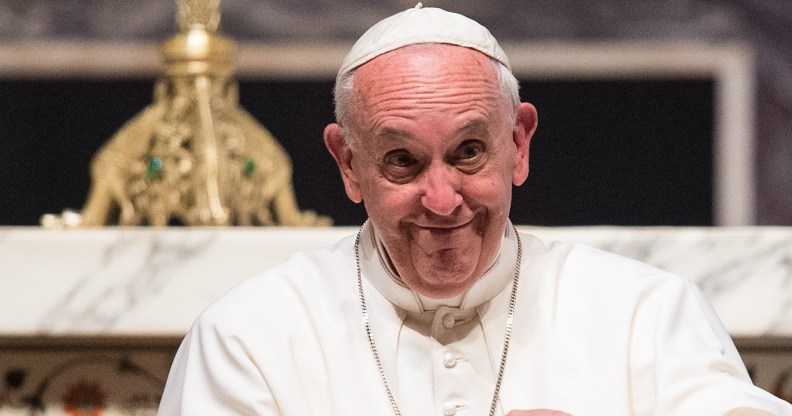Vatican attacked UN statement on HIV because it mentioned gay sex

A United Nations statement on HIV has allegedly been altered to tone down mentions of gay people… after objections from the Vatican.
The UN is this week holding a High-Level Meeting on Ending AIDS, with experts and ministers attending from across the world.
The meeting has already been steeped in controversy once, when a number of African LGBT groups were blocked from attending.
HIV activists have now claimed that the joint statement was altered from an earlier draft to tone down mentions of at-risk groups including sex workers and gay men.
A release from the groups, including the Global Network of Sex Work Projects and Global Forum on MSM & HIV, expresses “deep disappointment by the adoption of a flawed Political Declaration”.
A statement said: “The Political Declaration inexcusably fails to meaningfully address the HIV epidemic among key populations, including gay and bisexual men and other men who have sex with men, sex workers, people who use drugs, and transgender people.
“The Final Declaration damagingly excludes and misrepresents key populations.
“It also lacks an explicit commitment to support and finance key population-led and tailored prevention, care, and treatment services.
“Likewise, it is woefully misses the mark in highlighting legal and policy frameworks that stigmatize and criminalize our communities worldwide.
“While the document opens with a sweeping ‘commitment to end the AIDS epidemic by 2030’, our networks and many of its global civil society allies contend that today’s Political Declaration is a significant set-back in our work to end AIDS, particularly among key populations.”
Despite the toned-down statement, the Holy See – a permanent observer state at the UN – still complained that the statement referenced educating people about transmission among men who have sex with men.
The Holy See complained: “With respect to ‘comprehensive education’ or ‘information’ on ‘sexuality’, the Holy See reiterates the ‘primary responsibility’ and the ‘prior rights’ of parents, including their right to religious freedom, when it comes to the education and upbringing of their children.
“In that sense, the Holy See wishes to underline the centrality of the family, ‘the natural and fundamental group unit of society’, as well as the role and rights and duties of parents to educate their children.”
The Vatican also complained about a reference to transgender people.
The statement continued: “With reference to ‘gender’, the Holy See understands the term to be grounded in the biological sexual identity and difference that is male or female.
“Regarding the concepts of ‘gender norms’ and ‘gender stereotypes’ the Holy See does not recognize the idea that gender is socially constructed, rather gender recognizes the objective identity of the human person as born male or female.”
The Vatican also condemned any reference to condoms being used for safe sex practises.
Egypt, Iran, Saudi Arabia, Sudan and Indonesia also objected to the statement.
Tom Hayes of beyondpositive, who had been engaged with the UN through the process, attacked the ‘de-gayed’ statement and criticized the states who objected.
Mr Hayes said: “What the UN has done here beggars belief. They actively engaged their most at risk groups, their key populations, asked them for input on what would help them end their epidemic and then promptly ignored them.”
“This Political Declaration, as it stands, isn’t worth the paper it’s printed on. In some ways, with its actively exclusionary language, and what it deliberately fails to acknowledge, it is a huge step back from the previous declaration and will do more harm than good.
“Having been so easily manipulated by a small number of countries to their ideological will, you have to ask who the UN actually serves, because it’s not those in the rising epidemic.
“It’s not those are getting HIV today and tomorrow and the day after that. I think the organisation has to have a cold hard look at itself in the light of this poorly written and damaging document.”
The Global Forum on MSM & HIV said previously: “It is deplorable that the UN Member States can choose to overlook epidemiological data on key populations in favour of bogus beliefs about HIV and about key populations.
“We are dismayed and disturbed (if not surprised) that we find ourselves, yet again, in debates about issues that aren’t and shouldn’t be debatable!”
It continues: “We emphatically reject revisionist characterizations of the global HIV epidemic.
“We do not accept negative characterizations of men who have sex with men, sex workers, transgender people, and people who inject drugs, and we certainly disagree with the idea that key populations are only worthy of mention in the context of discussions about risk – especially since it reinforces old stereotypes about our communities as being irresponsible.
“We are not surprised by these actions because using key populations as a political wedge is a routinely employed tactic by governments to subjugate, oppress, debase, and belittle its citizens.
“These are also tactics deliberately used to throw activists off their game and to distract global attention away from State-sanctioned abuses and corruption.”

